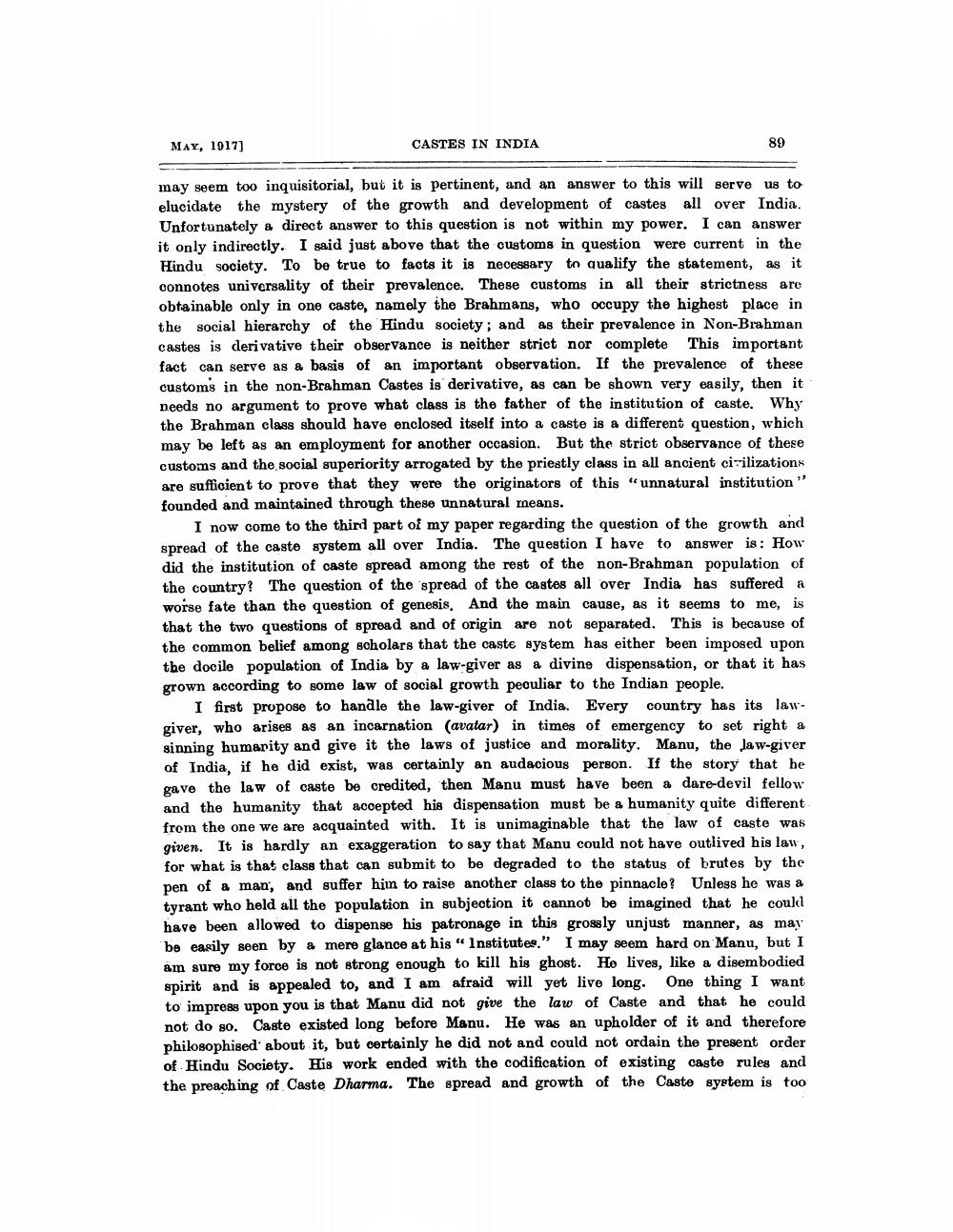________________
MAY, 1917)
CASTES IN INDIA
may seem too inquisitorial, but it is pertinent, and an answer to this will serve us to elucidate the mystery of the growth and development of castes all over India. Unfortunately & direct answer to this question is not within my power. I can answer it only indirectly. I said just above that the customs in question were current in the Hindu society. To be true to facts it is necessary to qualify the statement, as it connotes universality of their prevalence. These customs in all their strictness are obtainable only in one caste, namely the Brahmans, who occupy the highest place in the social hierarchy of the Hindu society; and as their prevalence in Non-Brahman castes is derivative their observance is neither strict nor complete This important fact can serve as a basis of an important observation. If the prevalence of these customs in the non-Brahman Castes is derivative, as can be shown very easily, then it needs no argument to prove what class is the father of the institution of caste. Why the Brahman class should have enclosed itself into a caste is a different question, which may be left as an employment for another occasion. But the strict observance of these customs and the social superiority arrogated by the priestly class in all ancient civilizations are sufficient to prove that they were the originators of this “unnatural institution” founded and maintained through these unnatural means.
I now come to the third part of my paper regarding the question of the growth and spread of the caste system all over India. The question I have to answer is: How did the institution of caste spread among the rest of the non-Brahman population of the country? The question of the 'spread of the castes all over India has suffered a worse fate than the question of genesis. And the main cause, as it seems to me, is that the two questions of spread and of origin are not separated. This is because of the common belief among scholars that the caste system has either been imposed upon the docile population of India by a law-giver as a divine dispensation, or that it has grown according to some law of social growth peculiar to the Indian people.
I first propose to handle the law-giver of India Every country has its law. giver, who arises as an incarnation (avatar) in times of emergency to set right a sinning humarity and give it the laws of justice and morality. Manu, the law-giver of India, if he did exist, was certainly an audacious person. If the story that he gave the law of caste be credited, then Manu must have been a dare-devil fellow and the humanity that accepted his dispensation must be a humanity quite different from the one we are acquainted with. It is unimaginable that the law of caste was given. It is hardly an exaggeration to say that Manu could not have outlived his law, for what is that class that can submit to be degraded to the status of brutes by the pen of a man, and suffer him to raise another class to the pinnacle? Unless he was a tyrant who held all the population in subjection it cannot be imagined that he could have been allowed to dispense his patronage in this grossly unjust manner, as may be easily seen by a mere glance at his" Institute." I may seem hard on Manu, but I am sure my force is not strong enough to kill his ghost. Ho lives, like a disembodied spirit and is appealed to, and I am afraid will yet live long. One thing I want to impress upon you is that Manu did not give the law of Caste and that he could not do so. Caste existed long before Manu. He was an upholder of it and therefore philosophised about it, but certainly he did not and could not ordain the present order of Hindu Society. His work ended with the codification of existing caste rules and the preaching of Caste Dharma. The spread and growth of the Caste syetem is too




